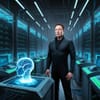Elon Musk's ambitious goals for artificial intelligence (AI) have sparked a heated debate about the future of human agency. Musk's vision for AI, as outlined in his Neuralink project, involves creating a symbiosis between humans and machines, with AI-enhanced cognition and decision-making.
However, critics argue that Musk's plans could lead to a loss of human agency, as people become increasingly reliant on AI systems for decision-making and problem-solving. This could result in a diminished capacity for human autonomy, creativity, and critical thinking.
Musk's views on AI are influenced by his concerns about the existential risks posed by advanced AI systems. He believes that the only way to mitigate these risks is to integrate AI into human cognition, effectively merging humans with machines.
While Musk's goals may be driven by a desire to prevent an AI-induced apocalypse, his critics argue that his approach could have unintended consequences, such as exacerbating social inequalities and eroding human dignity.
The debate surrounding Musk's AI ambitions raises fundamental questions about the future of human agency and the ethics of AI development. As AI continues to advance and become increasingly integrated into our lives, it is essential to consider the potential consequences of relying on machines for decision-making and problem-solving.


